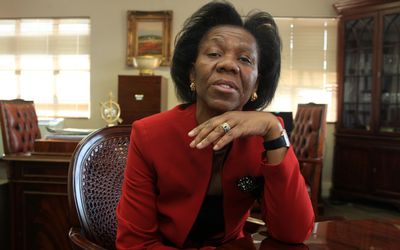NEW questions are being raised about how the Public Investment Corporation (PIC) invests pensioners’ money after it emerged this week the state-owned company is looking to buy out ArcelorMittals’ share of Daphne Mashile-Nkosi’s Kalagadi Manganese for R3.9bn.
Industry players at the Mining Indaba this week were surprised by the decision, describing the price tag on Kalagadi as “heavily overvalued”, suggesting the PIC would be acting to bail out the pet project of politically conneted Mashile-Nkosi, the widow of the late ANC stalwart Stanley Nkosi, rather than in the interests of pensioners. The R3.9bn is what ArcelorMittal has invested in the project to date.
This adds to the discomfort over a number of recent decisions by the PIC, which appear to be potentially more politically than financially motivated.
This includes the fact that the PIC effectively torpedoed the Chilean pharmaceutical group CFR’s R12bn bid for Adcock Ingram, partly because it was uncomfortable with family owned businesses; supported Dr Iqbal Surve’s buyout of Independent Newspapers; and ploughed R19bn into SA National Roads Agency bonds.
Kalagadi, which is owned by ArcelorMittal and Mashile-Nkosi’s Kalahari Resources, is building a mine and sinter plant in Northern Cape at a cost of R11bn. But the two shareholders have bumped heads repeatedly, culminating in ArcelorMittal’s decision in 2012 to sell its stake in November that year. ArcelorMittal refused to further fund the project, accusing Mashile-Nkosi of making decisions without its consent, not having proper tender processes in place, and a total lack of transparency. The High Court in Johannesburg has ordered Mittal to continue funding the project.
When approached this week, PIC chief investment officer Dr Daniel Matjila confirmed that the transaction was on the table, but said it was at a very early stage in terms of approval processes.
But should it proceed, it would add to a glut of public money that Mashile-Nkosi has recently been able to lay claim to.
At the indaba this week, Mashile-Nkosi revealed that she had also managed to secure a R2.2bn loan from the African Development Bank (ADB), which adds to another R1bn loan that Kalagadi scored from the state-owned Industrial Development Corporation (IDC). The IDC is also a shareholder in Kalagadi.
However, questions over why the government agencies are supporting the projects intensified after it emerged that commercial banks pulled out of the financing deal, leaving the ADB to go it alone.
“We are grateful to African Development Bank ... every door was closed on us because this has not been done by a woman and especially a black woman before,” said Mashile-Nkosi.
Kalagadi Manganese will use the loan to finish building the manganese mine and sinter plant. It also plans to build a smelter plant at Coegafor R7bn.
The government has spent billions building the Coega industrial zone and port, but has been struggling to attract the necessary activity.
“The numbers don’t make sense. I think the company is hugely overvalued,” said an industry player on the sidelines of the indaba.
“Also, the business plan doesn’t make sense. For every two million tons of ore that are transported that far, you will get only one million tons of alloy. Daphne should have built the smelter at the mine.”
Nevertheless, African Development Bank chief investment officer Alhassane Haidra praised Mashile-Nkosi for creating value in Africa for local Africans and indicated that the bank would consider further investment into the company.
Asked if the bank had any issues around governance issues as reported by ArcelorMittal, Haidra said it did not.
“Daphne has personality and maybe there were some clashes. As far as I know the issues were around ArcelorMittal being late on its equity agreement and an inability to reach a technical service agreement. I also think that maybe the economics around the smelter might not have been as attractive as it was five years ago for ArcelorMittal, which has smelting capabilities elsewhere,” said Haidra.
Mashile-Nkosi did not look worried about the numbers, pointing out that the value of sintered ore at around $100/t did not come close to the value of the smelted product (manganese alloys) at more than 10 times that. She believed that the company was actually undervalued.
She said while further funding was needed for the smelter, it could be generated from interested lenders and also from the cash flow that the company would start to make from the sales from the mine. The company expected revenues of around R7bn a year from its sintered product at full production expected in 2015.
“Once our cash flows are up we will also be able to attract funding more easily,” she said.
• This article was first published in Sunday Times: Business Times

Daphne Mashile-Nkosi. Picture: SUNDAY TIMES
NEW questions are being raised about how the Public Investment Corporation (PIC) invests pensioners’ money after it emerged this week the state-owned company is looking to buy out ArcelorMittals’ share of Daphne Mashile-Nkosi’s Kalagadi Manganese for R3.9bn.
Industry players at the Mining Indaba this week were surprised by the decision, describing the price tag on Kalagadi as “heavily overvalued”, suggesting the PIC would be acting to bail out the pet project of politically conneted Mashile-Nkosi, the widow of the late ANC stalwart Stanley Nkosi, rather than in the interests of pensioners. The R3.9bn is what ArcelorMittal has invested in the project to date.
This adds to the discomfort over a number of recent decisions by the PIC, which appear to be potentially more politically than financially motivated.
This includes the fact that the PIC effectively torpedoed the Chilean pharmaceutical group CFR’s R12bn bid for Adcock Ingram, partly because it was uncomfortable with family owned businesses; supported Dr Iqbal Surve’s buyout of Independent Newspapers; and ploughed R19bn into SA National Roads Agency bonds.
Kalagadi, which is owned by ArcelorMittal and Mashile-Nkosi’s Kalahari Resources, is building a mine and sinter plant in Northern Cape at a cost of R11bn. But the two shareholders have bumped heads repeatedly, culminating in ArcelorMittal’s decision in 2012 to sell its stake in November that year. ArcelorMittal refused to further fund the project, accusing Mashile-Nkosi of making decisions without its consent, not having proper tender processes in place, and a total lack of transparency. The High Court in Johannesburg has ordered Mittal to continue funding the project.
When approached this week, PIC chief investment officer Dr Daniel Matjila confirmed that the transaction was on the table, but said it was at a very early stage in terms of approval processes.
But should it proceed, it would add to a glut of public money that Mashile-Nkosi has recently been able to lay claim to.
At the indaba this week, Mashile-Nkosi revealed that she had also managed to secure a R2.2bn loan from the African Development Bank (ADB), which adds to another R1bn loan that Kalagadi scored from the state-owned Industrial Development Corporation (IDC). The IDC is also a shareholder in Kalagadi.
However, questions over why the government agencies are supporting the projects intensified after it emerged that commercial banks pulled out of the financing deal, leaving the ADB to go it alone.
“We are grateful to African Development Bank ... every door was closed on us because this has not been done by a woman and especially a black woman before,” said Mashile-Nkosi.
Kalagadi Manganese will use the loan to finish building the manganese mine and sinter plant. It also plans to build a smelter plant at Coegafor R7bn.
The government has spent billions building the Coega industrial zone and port, but has been struggling to attract the necessary activity.
“The numbers don’t make sense. I think the company is hugely overvalued,” said an industry player on the sidelines of the indaba.
“Also, the business plan doesn’t make sense. For every two million tons of ore that are transported that far, you will get only one million tons of alloy. Daphne should have built the smelter at the mine.”
Nevertheless, African Development Bank chief investment officer Alhassane Haidra praised Mashile-Nkosi for creating value in Africa for local Africans and indicated that the bank would consider further investment into the company.
Asked if the bank had any issues around governance issues as reported by ArcelorMittal, Haidra said it did not.
“Daphne has personality and maybe there were some clashes. As far as I know the issues were around ArcelorMittal being late on its equity agreement and an inability to reach a technical service agreement. I also think that maybe the economics around the smelter might not have been as attractive as it was five years ago for ArcelorMittal, which has smelting capabilities elsewhere,” said Haidra.
Mashile-Nkosi did not look worried about the numbers, pointing out that the value of sintered ore at around $100/t did not come close to the value of the smelted product (manganese alloys) at more than 10 times that. She believed that the company was actually undervalued.
She said while further funding was needed for the smelter, it could be generated from interested lenders and also from the cash flow that the company would start to make from the sales from the mine. The company expected revenues of around R7bn a year from its sintered product at full production expected in 2015.
“Once our cash flows are up we will also be able to attract funding more easily,” she said.
• This article was first published in Sunday Times: Business Times
























Register/Login
Close XMy News
You can only set up or view personalised news headlines when you are logged in as a registered user. Thereafter you can choose the sectors of industry in which you are interested, and the latest articles from those sectors will display in this area of your console.
Login or Register.Top Stories
My Watchlist
You can only set up or view your share watchlist when you are logged in as a registered user. Thereafter you can select a list of companies and enter your share details to monitor their performance.
Login or Register.My Clippings
You can only clip articles when you are logged in as a registered user. Thereafter you can click on the "Read later" icon at the top of an article to save it to this area of your console, where you can return to read it at any time.
Login or Register.Change: -1.21%
Change: -1.31%
Change: -1.11%
Change: -1.12%
Change: -2.16%
Data supplied by Profile Data
Change: 0.00%
Change: 0.00%
Change: -1.21%
Change: 0.00%
Change: 0.00%
Data supplied by Profile Data
Change: 0.02%
Change: 0.05%
Change: 0.13%
Change: 0.00%
Change: -0.38%
Data supplied by Profile Data
Change: 0.00%
Change: 0.00%
Change: 0.00%
Change: 0.00%
Change: 0.00%
Data supplied by Profile Data